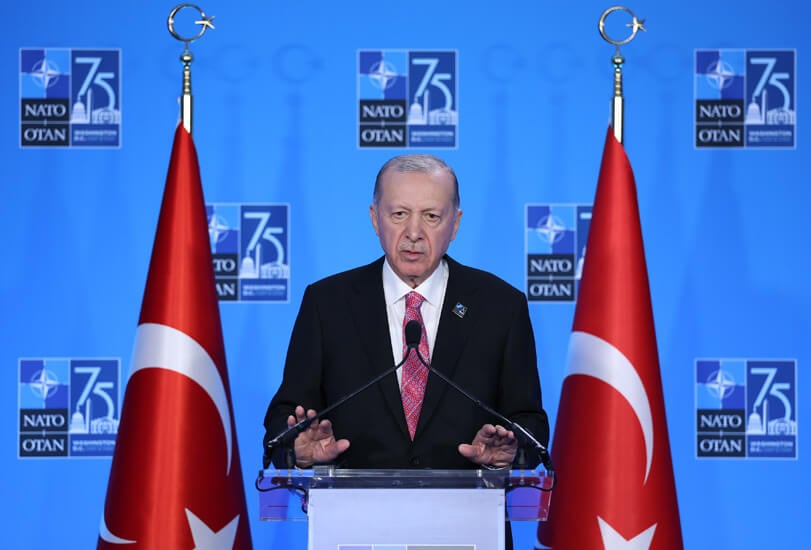Western countries are still taking baby steps to lift sanctions on Syria a month since the fall of the Bashar Al-Assad regime as the former rebels who are now its rulers confront the daunting task of rebuilding a country marked by devastation and collapse.
Many things have yet to change, not least the fact that Syria’s fate lies in the hands of multiple outside players with their own often competing security and other interests.
The influence of Iran and Russia may have diminished but others such as Turkey and Israel are still using military means to establish facts on the ground in their favour.
The incoming Trump administration will face an early foreign policy test in Syria. Differences between western countries as they formulate their new stance towards Syria and its de facto leader Ahmed Hussein Al-Sharaa - head of the Hayat Tahrir al-Sham (HTS) group formerly affiliated with Al-Qaeda - were encapsulated in what German media dubbed “handshakegate”.
In Damascus last week, Al-Sharaa refused to offer a handshake to Annalena Baerbock, Germany foreign minister. Jean-Noël Barrot, her French counterpart, did not extend his hand to Al-Sharaa, seemingly signalling solidarity with her.
Nonetheless, Barrot said on X that they had received “assurances from the new Syrian authorities that there will be broad participation — particularly by women — in the political transition.”
Germany is pushing the rest of the EU to adopt its stance that Assad-era sanctions should be eased on the condition that the rights of women and minorities are protected as well as other provisos. EU foreign ministers are set to debate the issue at a meeting in Brussels on 27 January.
The situation remains in flux
Syria’s new rulers have made some encouraging, perhaps under-appreciated, moves. Maysaa Sabrine was appointed the first woman to head the central bank on 30 December. Al-Sharaa has also insisted that Christians, Alawites, Druze and other minorities will retain their place in Syria.
But the situation remains in flux, with Al-Sharaa saying there will be no new elections for four years. A national dialogue that was set to convene during the first week of January has been postponed while some opposition groups say they were not invited.
The US has eased some restrictions on the transitional government to allow the entry of humanitarian aid
The US has made some slightly firmer moves towards Syria. It has eased some restrictions on the transitional government to allow the entry of humanitarian aid and dropped a $10 million bounty it had offered for the capture of Al-Sharaa.
But Barbara Leaf, who led the first US diplomatic delegation into Syria since Al-Assad was ousted and met Al-Sharra, was firm: “It was a good first meeting. We will judge by deeds not just by words.”
The US first designated Syria as a state sponsor of terrorism in 1979 and sanctions were ramped up, including by the EU, during the course of the civil war starting in 2011.
The Caesar Syria Civilian Protection Act of 2019 effectively banned states and private businesses from doing business with Al-Assad’s government while the US, EU and UN Security Council designated HTS a “terrorist” group.
Security is top priority
All these measures make it impossible for investors to initiate any long-term plans and projects for the country. Since 2011, the Syrian pound has lost 99 per cent of its value and the World Bank says 69 per cent of Syrians live on less than $3.65 a day.
The country faces the further challenge of reintegrating returning refugees and more than 115,000 have returned from countries such as Türkiye, Jordan and Lebanon since 8 December, the UN refugee agency said at the start of the year.
Many of the returnees are vulnerable women and children, with many men staying away for longer to earn much-needed cash. Within Syria, about 664,000 people remain newly displaced.
The Pentagon revealed last month that it actually has 2,000 personnel in Syria, not 900 as it had reported in previous years
While the US and other western powers wait and see before making further overtures towards Syria, security is their top priority and may come at the expense of consolidating democratic gains and averting a return to chaos, warn many Syria watchers.
The Pentagon revealed last month that it actually has 2,000 personnel in Syria, not 900 as it had reported in previous years. The revelation was read as a warning to Türkiye as it battles Kurdish forces, which were supported by the Biden administration to fight against the Islamic State.
The Kurdish forces
The Kurdish forces include the People’s Protection Units (YPG) classified by Türkiye as a terrorist organisation. “The only fate awaiting those who choose terror and violence is to be buried in the ground with their weapons. I am saying this openly, no power can prevent this,” said Recep Tayyip Erdoğan, Turkish president, on 7 January.
 The only fate awaiting those who choose terror and violence is to be buried in the ground with their weapons - Recep Tayyip Erdoğan
The only fate awaiting those who choose terror and violence is to be buried in the ground with their weapons - Recep Tayyip Erdoğan
Clashes in several villages around the city of Manbij left 101 dead, including 85 members of pro-Turkish groups and 16 from the Kurdish-dominated Syrian Democratic Forces (SDF), the Britain-based Syrian Observatory for Human Rights said on 5 January.
President-elect Donald Trump remains a wild card. When asked this week about the potential withdrawal of US troops from Syria, he said: “I won't tell you that because that's part of a military strategy.”
Further pressuring Syria is Israel, which has carried out hundreds of air strikes on targets in Syria and seized control of a demilitarised buffer zone that was established in a 1974 ceasefire.
As ordinary Syrians attempt to rebuild shattered lives, their patience will continue to be in sore need.